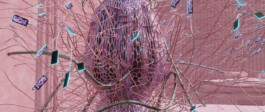Where does the rest of the world begin?
In reference to the microbiologist Lynn Margulis, the currently emerging works focus on the interconnections of human consciousness with our natural environment, a symbiotic way of life and the concept of the metaorganism. In particular, the omnipresent symbiosis with microorganisms serves me as a metaphor forreflecting on our self-image as humans, our relationship to organic and non-organic actors, and the need to develop new perspectives to address pressing ecological problems.
Lynn Margulis has extensively written about the concept of Symbiosis - the intimate »living together« ofdifferent organisms – and defined it as a key organizational motif of the microbial world, existing in bothmutualistic and parasitic formations. Symbiosis is now recognized as a central driver of evolutionary innovation. In recent years the research of microbiomes of organisms and its impact on nutrition, immunity, cognition, mood and even feelings of pain or anxiety has received a lot of attention. This importance of the metaorganism challenges the western philosophical concepts of individuality, singular consciousness, and subjectivity. It steers our thinking towards a collective co-existence and questions the dividing dualism of »nature« and »culture«. These ideas will be linked with research into Neural Synchrony, which is the correlation of brain activity across two or more people, or even other organisms, highlighting our social interconnectivity.
2024, digital animation with sound and Mixed Reality experience









Where does the rest of the world begin?
In reference to the microbiologist Lynn Margulis, the currently emerging works focus on the interconnections of human consciousness with our natural environment, a symbiotic way of life and the concept of the metaorganism. In particular, the omnipresent symbiosis with microorganisms serves me as a metaphor forreflecting on our self-image as humans, our relationship to organic and non-organic actors, and the need to develop new perspectives to address pressing ecological problems.
Lynn Margulis has extensively written about the concept of Symbiosis - the intimate »living together« ofdifferent organisms – and defined it as a key organizational motif of the microbial world, existing in bothmutualistic and parasitic formations. Symbiosis is now recognized as a central driver of evolutionary innovation. In recent years the research of microbiomes of organisms and its impact on nutrition, immunity, cognition, mood and even feelings of pain or anxiety has received a lot of attention. This importance of the metaorganism challenges the western philosophical concepts of individuality, singular consciousness, and subjectivity. It steers our thinking towards a collective co-existence and questions the dividing dualism of »nature« and »culture«. These ideas will be linked with research into Neural Synchrony, which is the correlation of brain activity across two or more people, or even other organisms, highlighting our social interconnectivity.
2024, digital animation with sound and Mixed Reality experience








